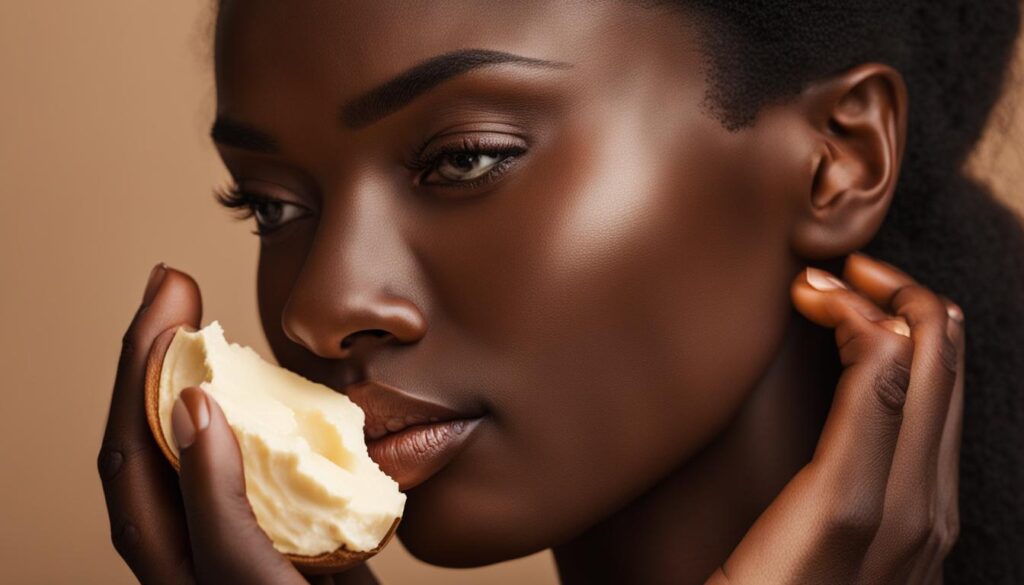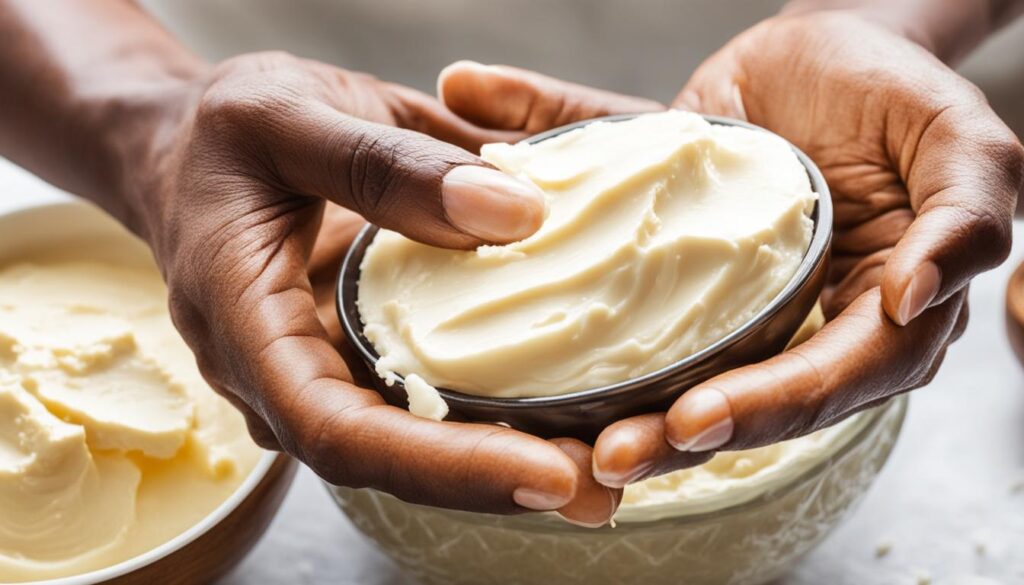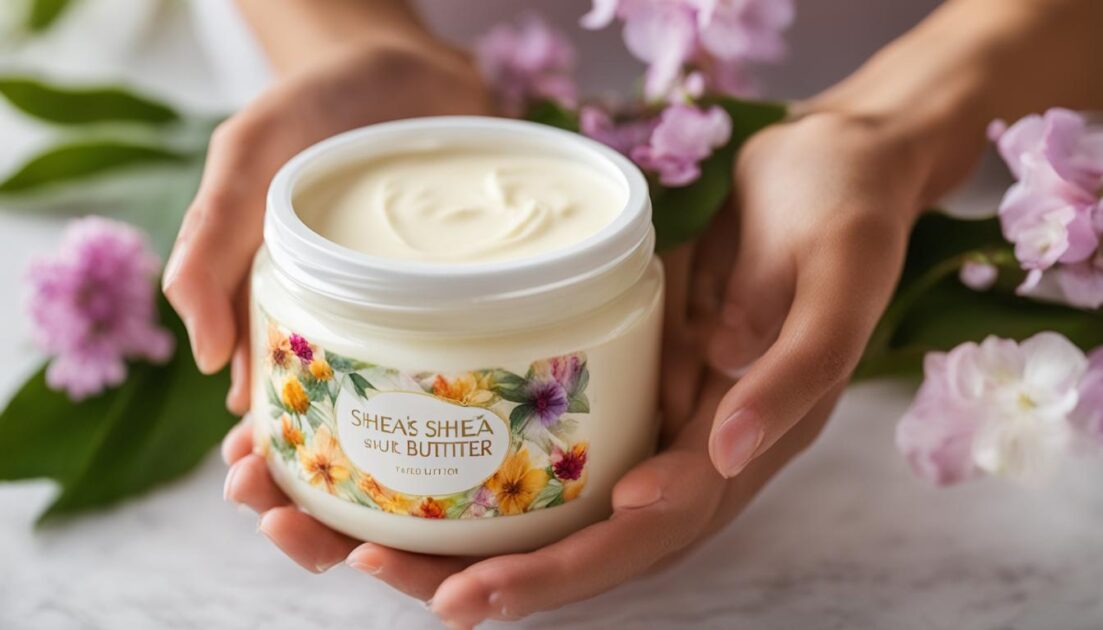As a natural skincare enthusiast, I am always on the lookout for ingredients that can provide maximum nourishment and revitalization for the skin. One such ingredient that has captured my attention is shea butter. Known for its moisturizing properties, anti-inflammatory and anti-aging effects, as well as its healing properties, shea butter has become a staple in my skincare routine.
Derived from the nuts of the shea tree, shea butter has been used for centuries due to its high concentration of vitamins and fatty acids. It is a safe and effective ingredient for all skin types, delivering excellent moisturizing effects without clogging pores or causing irritation.
One of the standout benefits of shea butter is its ability to soothe and nourish dry skin. Its rich texture penetrates deeply into the skin, creating a protective barrier that locks in moisture and helps restore the skin’s natural hydration levels. For those dealing with conditions like eczema or dermatitis, shea butter provides much-needed relief, calming inflammation and reducing irritation.
Furthermore, shea butter’s anti-inflammatory properties make it an exceptional ingredient for promoting youthful-looking skin. It helps to reduce redness and puffiness, while the antioxidants present in shea butter protect the skin from free radicals and prevent premature aging.
Key Takeaways:
- Shea butter is a natural skincare ingredient with nourishing and revitalizing properties.
- It is safe for all skin types, including sensitive skin, and does not trigger allergies.
- Shea butter provides excellent moisturizing effects and helps reduce dryness.
- Its anti-inflammatory properties make it beneficial for treating skin conditions like eczema and dermatitis.
- Shea butter’s antioxidant benefits protect the skin from premature aging.
Shea Butter is Safe for All Skin Types

Shea butter is a versatile and beneficial skincare ingredient that is safe for all skin types. Unlike most tree nut products, shea butter is low in proteins, making it unlikely to trigger allergies. In fact, there is no documented medical literature of allergic reactions to topical shea butter. This makes it an excellent choice for individuals with sensitive skin or those with allergies to other tree nuts.
One of the reasons shea butter is safe for all skin types is because it does not contain chemical irritants that can dry out the skin or clog pores. It is a natural and gentle product that nourishes the skin without causing any adverse reactions. Whether you have oily skin, dry skin, or combination skin, you can confidently incorporate shea butter into your skincare routine knowing that it will provide moisturizing benefits without causing any unwanted side effects.
Furthermore, shea butter is suitable for individuals with sensitive skin. Its low protein content and absence of chemical irritants make it an ideal choice for those who are prone to skin sensitivities or have reactive skin. Shea butter is known for its soothing properties, and it can help calm and comfort sensitive skin, providing relief from redness, inflammation, and irritation.
Overall, shea butter is a safe and nourishing skincare ingredient that is suitable for all skin types, including sensitive skin. Its low protein content and lack of chemical irritants make it an excellent choice for individuals who want to moisturize and nourish their skin without the risk of triggering allergies or causing irritation.
| Benefits of Shea Butter for All Skin Types |
|---|
| Safe for sensitive skin |
| Low in proteins |
| Does not trigger allergies |
| Nourishing and moisturizing |
| Gentle and non-irritating |
Shea Butter’s Moisturizing Properties
Shea butter is widely recognized for its exceptional moisturizing effects on the skin. A key factor contributing to its hydrating abilities lies in its rich composition of fatty acids.
These fatty acids, including linoleic, oleic, stearic, and palmitic acids, offer multiple benefits. When applied, they are rapidly absorbed into the skin, aiding in the restoration of lipids and the creation of moisture. This process helps to maintain and strengthen the skin’s natural barrier, preventing dryness and reducing the risk of moisture loss.
The moisturizing effects of shea butter make it an invaluable ingredient in skincare products targeting dry or dehydrated skin. By deeply nourishing the skin, shea butter helps to combat flakiness, roughness, and discomfort caused by inadequate moisture levels.
Moreover, the restoration of lipids provided by shea butter promotes a supple and plump appearance, enhancing the overall dryness-reducing effects. Whether used as a standalone moisturizer or incorporated into creams, lotions, or balms, shea butter offers a natural and effective solution to combat dryness and promote hydration.
Overall, the moisturizing properties of shea butter, mediated by its fatty acid composition, make it a valuable ally in the pursuit of well-hydrated, healthy-looking skin.
Shea Butter’s Key Moisturizing Benefits:
- Restoration of lipids in the skin
- Creation and maintenance of moisture
- Reduction of dryness and discomfort
- Enhancement of the skin’s natural barrier
- Combating flakiness and roughness
- Promotion of a supple and plump appearance
Shea Butter Does Not Make the Skin Oily

When it comes to skincare, finding the right balance is key. And that’s where shea butter comes in. Despite its rich and creamy texture, shea butter is surprisingly non-greasy and won’t leave your skin feeling oily.
This is because shea butter contains two essential fatty acids – linoleic acid and oleic acid – that work together to balance the skin’s natural oils. Linoleic acid helps to regulate oil production, while oleic acid moisturizes and nourishes the skin. The combination of these two acids ensures that shea butter absorbs easily into the skin without clogging pores or causing excess oiliness.
Shea butter’s ability to balance oils makes it suitable for all skin types. Whether you have dry, oily, or sensitive skin, shea butter can help restore moisture and promote a healthy complexion.
Shea butter is a multi-tasking skincare ingredient that hydrates without making your skin greasy. Its unique composition of fatty acids allows it to absorb easily and restore the skin’s natural balance of oils.
So, if you’ve been avoiding moisturizers for fear of making your skin oily, shea butter is the perfect solution. Its lightweight formula absorbs quickly and leaves your skin feeling soft, smooth, and supple.
But don’t just take my word for it. Try incorporating shea butter into your skincare routine and experience the benefits for yourself. You’ll be amazed at how this natural ingredient can transform your skin without leaving any greasy residue.
Shea Butter’s Anti-Inflammatory Properties

Shea butter is not only a moisturizing powerhouse but also exhibits remarkable anti-inflammatory properties. These properties can be attributed to the presence of plant esters in shea butter, which have been found to effectively reduce inflammation when applied to the skin.
When shea butter is applied topically, it triggers the production of cytokines, which are small proteins that play a crucial role in regulating inflammation and immune response in the body. By triggering cytokines and other inflammatory cells, shea butter helps to slow down their production and minimize the inflammation caused by various environmental factors and inflammatory skin conditions, such as eczema.
This anti-inflammatory action of shea butter makes it a valuable ingredient in skincare products aimed at reducing redness, soothing irritated skin, and managing inflammatory skin conditions. Whether you’re dealing with a pesky skin rash or regular bouts of eczema, shea butter can provide much-needed relief and comfort.
“The anti-inflammatory properties of shea butter make it an excellent choice for those struggling with inflammatory skin conditions. Its ability to trigger cytokines and reduce irritation can soothe redness, calm the skin, and provide relief.”
In addition to its anti-inflammatory benefits, shea butter also offers moisturizing and nourishing effects, making it a powerful multitasker for your skincare routine. By combining intense hydration with inflammation reduction, shea butter helps promote healthier skin and an improved complexion.
| Benefits of Shea Butter’s Anti-Inflammatory Properties: | How It Works |
|---|---|
| Reduces inflammation | Shea butter triggers cytokines and other inflammatory cells, slowing down their production and minimizing inflammation. |
| Soothes irritated skin | The anti-inflammatory action of shea butter provides relief for irritated skin, reducing redness and calming the skin’s response. |
| Manages inflammatory skin conditions | Shea butter can help alleviate symptoms of inflammatory skin conditions like eczema by minimizing inflammation and promoting overall skin health. |
Shea Butter’s Antioxidant Benefits

Shea butter is not only rich in moisturizing properties but also contains significant levels of essential vitamins A and E. These vitamins play a crucial role in promoting antioxidant activity, which is vital for maintaining healthy skin.
Antioxidants are powerful compounds that protect skin cells from harmful free radicals. Free radicals are unstable molecules that can cause damage to cells, leading to premature aging and various skin concerns. However, antioxidants neutralize these free radicals, preventing their harmful effects and helping to maintain a youthful and radiant complexion.
By incorporating shea butter into your skincare routine, you can harness the antioxidant benefits of vitamins A and E. These vitamins work together to protect your skin from oxidative stress, environmental pollutants, and UV radiation, all of which can contribute to premature aging.
“The antioxidant activity of shea butter helps to prevent the breakdown of collagen, a protein responsible for maintaining skin’s elasticity. By protecting collagen fibers, shea butter helps to keep the skin firm and supple.”
Furthermore, shea butter promotes the regeneration of skin cells, aiding in the repair of damaged tissue. This can help reduce the appearance of fine lines, wrinkles, and age spots, giving your skin a more youthful and revitalized appearance.
To benefit from shea butter’s antioxidant properties, simply apply a small amount to your skin and gently massage it in. Allow the butter to absorb fully before proceeding with your regular skincare routine. You can also look for skincare products that contain shea butter as an active ingredient to enhance the antioxidant benefits.
Embrace the natural power of shea butter and protect your skin cells from oxidative stress. Experience the transformative effects of this antioxidant-rich ingredient and prevent premature aging for a healthy and vibrant complexion.
Key Antioxidant Benefits of Shea Butter
| Benefit | Description |
|---|---|
| Protects skin cells | Shea butter’s antioxidants shield skin cells from free radicals, preventing damage and maintaining skin health. |
| Prevents premature aging | By combatting free radicals, shea butter helps prevent the signs of premature aging, such as wrinkles and age spots. |
| Promotes collagen production | The antioxidant activity of shea butter supports collagen synthesis, improving skin’s elasticity and firmness. |
| Repairs damaged skin | With its regenerative properties, shea butter aids in healing damaged skin and reducing the appearance of imperfections. |
Shea Butter’s Antibacterial and Antifungal Properties

Shea butter, in addition to its moisturizing benefits, has been found to possess possible antibacterial and antifungal properties. Studies suggest that this natural ingredient may play a role in fighting skin infections and killing fungal spores.
“Shea butter has shown promise in reducing the presence of acne-causing bacteria on the skin. It also exhibits action against fungi responsible for ringworm and athlete’s foot.”
– Dr. Jane Wilson, Dermatologist
One of the key components of shea butter that contributes to its antibacterial and antifungal effects is its high concentration of natural fatty acids. These fatty acids, such as oleic acid and stearic acid, have been shown to have antimicrobial properties that can help combat bacteria and fungi.
Furthermore, shea butter’s rich content of vitamins and antioxidants may also contribute to its ability to fight off skin infections. Vitamins A and E, in particular, have been recognized for their ability to protect the skin against harmful microorganisms.
Incorporating shea butter into your skincare routine may yield benefits beyond nourishing and moisturizing the skin. Its potential antibacterial and antifungal properties can provide an additional layer of protection against common skin infections, making it a valuable ingredient for maintaining healthy and radiant skin.
| Antibacterial Benefits | Antifungal Benefits |
|---|---|
|
|
While more research is needed to fully understand the extent of shea butter’s antibacterial and antifungal properties, these preliminary findings highlight its potential as a natural ingredient in the fight against skin infections and fungal conditions. Shea butter’s multifaceted benefits make it a valuable addition to any skincare routine.
Shea Butter’s Ability to Improve Skin Conditions

Shea butter offers a multitude of benefits for enhancing various skin conditions. Let me walk you through some of its remarkable properties:
Preventing Acne: Shea butter helps balance oil production, reducing the likelihood of clogged pores and acne breakouts.
Boosting Collagen Production: Collagen is essential for maintaining plump and youthful-looking skin. Shea butter promotes collagen synthesis, leaving your skin firm and elastic.
Promoting Cell Regeneration: Thanks to its rich nutrient profile, shea butter aids in promoting cell regeneration, leading to a healthier and rejuvenated complexion.
Reducing the Appearance of Stretch Marks: Shea butter’s nourishing properties can help minimize the appearance of stretch marks by moisturizing the skin and improving its elasticity.
Relieving Skin Burns: The soothing and healing properties of shea butter make it an excellent remedy for relieving discomfort and promoting the healing process in the case of skin burns.
Soothing Insect Bites: Shea butter’s anti-inflammatory effects can help calm and soothe the itching and irritation associated with insect bites.
Promoting Wound Healing: Shea butter’s natural healing properties make it effective in promoting the healing of wounds, cuts, and scrapes.
Relieving Muscle Soreness: Shea butter’s anti-inflammatory and soothing effects can provide relief from muscle soreness and inflammation.
To illustrate the impressive range of benefits shea butter offers for skin improvement, here’s a comprehensive table:
| Benefit | Description |
|---|---|
| Preventing Acne | By balancing oil production |
| Boosting Collagen Production | Results in plumper, more youthful skin |
| Promoting Cell Regeneration | For a healthier, rejuvenated complexion |
| Reducing the Appearance of Stretch Marks | By moisturizing and improving skin elasticity |
| Relieving Skin Burns | Soothes and promotes healing |
| Soothing Insect Bites | Alleviating itching and irritation |
| Promoting Wound Healing | Supports the healing process of wounds |
| Relieving Muscle Soreness | Soothes sore muscles and reduces inflammation |
This comprehensive skincare ingredient truly has it all when it comes to enhancing the appearance and health of your skin. With shea butter, you can enjoy a natural approach to skincare and experience the remarkable benefits it has to offer.
As we’ve explored the incredible benefits of shea butter, the next section will delve into its moisturizing properties and how it can keep your skin hydrated and nourished.
Shea Butter’s Moisturizing Benefits for Hair

Shea butter is not only great for the skin but also for the hair. Its moisturizing properties make it an excellent choice for nourishing and hydrating hair strands.
When applied to the hair, shea butter helps to seal in moisture, preventing dryness and breakage. It forms a protective barrier that locks in hydration, keeping the hair soft, healthy, and hydrated.
Furthermore, shea butter can be particularly beneficial for treating dandruff. Its moisturizing properties help to restore moisture to the scalp, reducing dryness and flakiness associated with dandruff.
To harness the moisturizing benefits of shea butter for your hair, you can create a DIY hair mask by combining shea butter with other natural ingredients like coconut oil or avocado oil. This can help to provide deep hydration and nourishment to your hair.
“Shea butter is an excellent natural moisturizer for the hair, helping to seal in moisture and prevent breakage. It can also be effective in treating dandruff by restoring moisture to the scalp.”
Whether you have dry, damaged hair or want to maintain the health and moisture balance of your hair, shea butter can be a valuable addition to your hair care routine.
By incorporating shea butter into your hair care routine, you can achieve stronger, healthier hair that is less prone to breakage and dryness. Whether your hair is chemically treated, heat-styled, or simply in need of some extra love and moisture, shea butter can be a game-changer in maintaining its health and vitality.
How to Incorporate Shea Butter into Your Skincare Routine
Shea butter is a versatile natural ingredient that can be seamlessly integrated into your skincare routine. Whether you want to hydrate dry skin, soothe irritation, or promote a youthful complexion, raw shea butter can provide numerous benefits for your skin.
To begin incorporating shea butter into your skincare routine, start by choosing raw, unrefined shea butter. This ensures that it retains all of its natural nutrients, making it more effective for nourishing and revitalizing your skin.
Before applying shea butter directly to your face or body, it is advisable to conduct a patch test. This involves applying a small amount of shea butter to a small area of your skin and monitoring for any adverse reactions. This precautionary step helps to ensure that you do not experience any allergic reactions or sensitivities.
Additionally, you can customize your shea butter by blending it with carrier oils or essential oils that suit your skin’s specific needs. For instance, mixing shea butter with jojoba oil can enhance its moisturizing properties, while adding a few drops of lavender essential oil can provide a soothing and calming effect.
Once you have chosen the right shea butter and personalized your blend, incorporate it into your daily skincare routine. Apply a small amount of shea butter to your face, body, or hair, depending on your desired benefits. Massage it gently into the skin to help it absorb effectively, and allow it to work its magic throughout the day or overnight.
With its remarkable moisturizing abilities and numerous benefits for the skin, shea butter is a valuable addition to any skincare routine. By following these steps and integrating shea butter into your daily regimen, you can unlock its full potential and enjoy the beautiful results it brings.
FAQ
What are the benefits of shea butter for the skin?
Shea butter has moisturizing properties, anti-inflammatory effects, and anti-aging benefits. It also has healing properties and is nourishing for the hair. Shea butter can soothe dry skin, treat eczema, and provide relief for dermatitis.
Is shea butter safe for all skin types?
Yes, shea butter is safe for all skin types. It is a tree nut product but is low in proteins that can trigger allergies. It does not contain chemical irritants that dry out the skin or clog pores, making it suitable for nearly all skin types, including sensitive skin.
How does shea butter moisturize the skin?
Shea butter contains fatty acids like linoleic, oleic, stearic, and palmitic acids, which are rapidly absorbed into the skin. These fatty acids restore lipids and create moisture, helping to maintain the skin’s barrier and prevent dryness.
Does shea butter make the skin oily?
No, shea butter does not make the skin oily. It contains linoleic acid and oleic acid, which balance each other out and allow shea butter to be easily absorbed without leaving an oily residue. It helps restore the natural balance of oils in the skin without causing excess oiliness.
What are the anti-inflammatory properties of shea butter?
Shea butter contains plant esters that have been found to possess anti-inflammatory properties. When applied to the skin, shea butter triggers cytokines and other inflammatory cells to slow down their production. This helps minimize irritation caused by environmental factors and inflammatory skin conditions such as eczema.
How does shea butter act as an antioxidant?
Shea butter contains high levels of vitamins A and E, which promote strong antioxidant activity. Antioxidants protect the skin cells from free radicals, preventing premature aging and maintaining a youthful appearance.
Does shea butter have antibacterial and antifungal benefits?
Yes, shea butter has been found to have antibacterial and antifungal benefits. Some studies suggest that it may decrease the amount of acne-causing bacteria on the skin and kill spores of fungi that cause ringworm and athlete’s foot.
How can shea butter improve skin conditions?
Shea butter can help prevent acne by balancing oil production, boost collagen production for plumper skin, promote cell regeneration for a healthier complexion, reduce the appearance of stretch marks, soothe skin burns and insect bites, promote wound healing, and relieve muscle soreness.
How does shea butter benefit the hair?
Shea butter moisturizes the hair, seals in moisture, and prevents breakage. It can also help treat dandruff by restoring moisture to the scalp.
How can I incorporate shea butter into my skincare routine?
You can apply shea butter directly to the skin and hair. It is important to choose raw, unrefined shea butter for maximum benefits. Patch testing is recommended before use to check for any potential allergic reactions. Shea butter can also be customized by mixing it with carrier oils or essential oils to create personalized skincare blends. It can be incorporated into the daily skincare routine for its numerous benefits for the skin.






